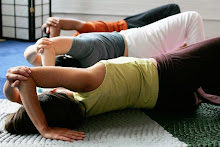
Sometimes it's hard to stay on an even keel. It seems impossible to detach from the Bad News and just settle down, and breathe. In stressful circumstances, especially if those circumstances seem prolonged, it's human nature to get caught up in beliefs or coping mechanisms that don't serve us. Two biggies are perfectionism and urgency.
There's actually another "cousin" to these two, and it is Worry. Most of us know, on an intellectual level at least, that worrying is a waste of time. Worry doesn't affect the outcome of what you're worrying about. The best cure for worry is to take action. Any action, preferably something small, can begin to remove the sense of powerlessness that takes over when you're in the downward spiral of useless worry. Some people take action by pouring a vodka, munching a brownie or ten, or warming up the credit card. There are positive alternatives that are more likely to take you toward an actual solution. Instead of worrying, you could make a list, or clean out a drawer, or go for a walk. Your next actions will be much clearer if you begin with something. But then, what if you worry whether the action you're taking is the right one?
You can earn a lot of points in our culture for being a perfectionist. You might be perceived as being difficult, but all will be forgiven, you tell yourself, because you are exacting, you have the highest standards, and everything must be Just So or it's No Go. "If I can't do it right, then I'm just not going to do it." The problem is that perfectionism can serve as a big smoke-screen for non-productivity. In terms of real output, perfectionists come out the same as the unabashed slackers. They just get to feel superior. Soon, however, something MUST be done. Worry arrives again, this time with Urgency.
Urgency is to blame for many bad decisions -- which is what gets us back to worrying. We tend to give our attention to what is the most urgent, at the expense of things that are less urgent, but more important in the long run. Unintended consequences and overall shoddiness frequently characterize knee-jerk reactions to urgency. Excuses abound. "I don't have time to mess around. I have to DO SOMETHING NOW." The spiral continues.
The Feldenkrais Method offers an effective solution for stepping off the merry-go-round of worry, urgency, and perfectionism, and toward effective, intelligent action. Each lesson provides the opportunity to test the approach with something small and inconsequential, and then to look for opportunities to apply the learning to daily life. The approach is based on making successive approximations toward the desired end. You have to begin somewhere, so begin with a small action, and see how that goes. Your first action will not be perfect, probably, and it will probably not provide an instant solution or immediate arrival at the goal. That needs to be OK.
If the first approximation was a disaster, you can try something different. What the hell? If the first approximation was not a total wash, you can take the elements that worked, and see how to make those work better. You can vary the other elements, and see what the effects are. Gradually, each successive approximation improves. You get better with experience. And, quite counter-intuitively, moving by successive approximations toward the goal can actually be quicker and more efficient than trying to do it perfectly on the first go. During a Feldenkrais lesson, it's likely that you will be so absorbed, amused, and engaged, that mental and physical stresses seem to evaporate for a time.
Now there is a caveat here. I'm not talking about doing the same thing over and over, and that somehow the magic of rote learning takes over and it will get better. If anything, rote learning perpetuates mistakes by forging deep neural pathways. We all have had a friend at one time or another who was looking for "Mr. Right," but because of urgency and worry, she found "Mr. Right Now," who turned out to be "Mr. Wrong." Working by successive approximations toward a goal requires some reflection, analysis, and mindfulness. Your aim is not just to have another go and hope for the best, but rather to have a specific intention to take a small action so that the next approximation is better in some way. It's the only way to make mistakes valuable-- to learn from them.
When you can spare a quiet hour for yourself, please come back to this post and click on this link. It's an mp3 full-length Awareness Through Movement lesson, where you can listen, move, and experience what I'm talking about. Your own small, comfortable body movements become a metaphor for the kind of action that is possible in your life. Afterwards, give yourself some time to notice what feels different from when you started. Sometimes, the smallest differences can make a big difference.
In the Feldenkrais Method, there's no failure-- only information. The work is so applicable to such a variety of human issues that it is useful to almost anybody. There's no better time to invest time and attention in yourself. New possibilities can emerge when you least expect it. Isn't that a great alternative to worry, urgency, and perfectionism?
[Additional Awareness Through Movement mp3 lessons are available for purchase on our website.]



No comments:
Post a Comment